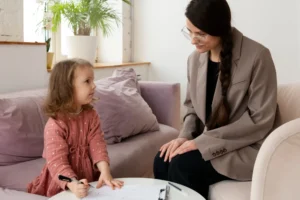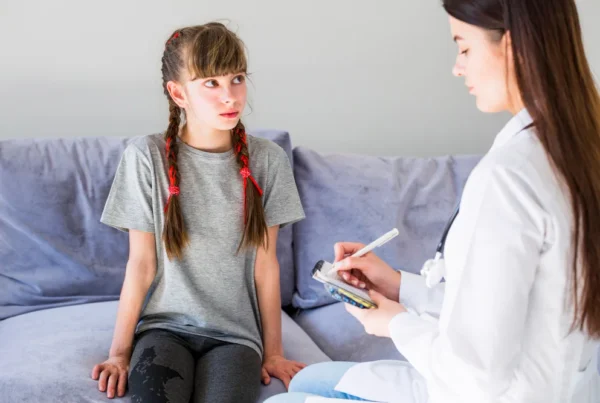When it comes to children’s mental health, understanding the roles of child psychologists and child psychiatrists is crucial. Both professions specialize in treating emotional and behavioral issues in children, but they differ in their approaches and qualifications.
Introduction
Mental health care for children is an essential aspect of their overall well-being. As children face various challenges throughout their developmental years—ranging from school pressures to social relationships—seeking professional help can make a significant difference. However, when it comes to seeking mental health support, parents often find themselves wondering: should I consult a child psychologist or a child psychiatrist?
Both child psychologists and child psychiatrists play pivotal roles in supporting children’s mental health. However, their approaches, qualifications, and methods of treatment differ significantly. Understanding these differences is key to ensuring that children receive the right care.
What Is a Child Psychologist?
Defining the Role of a Child Psychologist
A child psychologist is a professional trained to understand and treat the psychological, emotional, and behavioral issues that children face. They hold a doctoral degree (Ph.D. or Psy.D.) in psychology, which requires extensive education and training in understanding human behavior, development, and mental health.
Child psychologists focus on therapy and counseling. They use various therapeutic techniques to help children overcome emotional challenges and develop healthy coping mechanisms. Some of the most common types of therapy used by child psychologists include:
- Cognitive Behavioral Therapy (CBT): A highly effective approach that helps children identify negative thought patterns and behaviors, replacing them with healthier ways of thinking and acting.
- Play Therapy: Especially beneficial for younger children, play therapy uses play to help children express feelings, resolve conflicts, and develop emotional intelligence.
- Family Therapy: Involves working with the family unit to address family dynamics that may contribute to the child’s mental health challenges.
Common Issues Addressed by Child Psychologists
Child psychologists work with children facing a wide range of mental health issues, such as:
- Emotional difficulties: Anxiety, depression, stress, and low self-esteem.
- Behavioral problems: Aggression, defiance, conduct issues, and issues with authority.
- Developmental concerns: Autism spectrum disorders, attachment disorders, and social difficulties.
By focusing on therapy, child psychologists help children address these challenges through communication, behavioral modification, and emotional support.
What Is a Child Psychiatrist?
Defining the Role of a Child Psychiatrist
A child psychiatrist, in contrast, is a medical doctor (M.D. or D.O.) who specializes in diagnosing and treating mental health disorders in children and adolescents. To become a child psychiatrist, professionals must complete medical school, followed by psychiatric training, and a specialized fellowship in child and adolescent psychiatry. This additional medical training allows them to assess both the physical and mental aspects of a child’s health.
Child psychiatrists approach mental health from a medical perspective and are able to prescribe medications to help manage symptoms. This makes them particularly well-suited to treat more severe psychiatric disorders that may not respond to therapy alone.
Common Conditions Treated by Child Psychiatrists
Child psychiatrists treat a variety of mental health conditions, especially those that may require medication. Some of the common conditions treated by child psychiatrists include:
- Attention Deficit Hyperactivity Disorder (ADHD): A condition that affects attention, impulsivity, and hyperactivity.
- Anxiety and Depression: When emotional difficulties like anxiety or depression are severe, medication may be needed to help stabilize mood and alleviate symptoms.
- Bipolar Disorder: A condition characterized by extreme mood swings, from manic highs to depressive lows.
- Psychotic Disorders: Conditions such as schizophrenia, which require complex medication regimens to manage symptoms.
Child psychiatrists can combine medication with therapy to help manage symptoms and improve a child’s overall functioning.
Key Differences Between a Child Psychologist and a Child Psychiatrist
Qualifications and Training
- Child Psychologist: Child psychologists hold a doctoral degree (Ph.D. or Psy.D.) in psychology. They are trained in various therapeutic approaches to address mental health issues, but they cannot prescribe medication. Their focus is on providing therapy and behavioral interventions.
- Child Psychiatrist: Child psychiatrists are medical doctors who specialize in mental health. Their training includes medical school, psychiatric residency, and child and adolescent psychiatry fellowship. Because they are doctors, child psychiatrists can prescribe medications and often use a medical approach in treatment.
Treatment Approaches
- Child Psychologist: The primary role of a child psychologist is to provide psychotherapy. They focus on using talk therapy, behavioral techniques, and family therapy to address mental health challenges. Their aim is to help children understand and manage their emotions and behaviors without the use of medications.
- Child Psychiatrist: Child psychiatrists take a medical approach to treatment. They use a combination of medication and therapy to manage more severe mental health conditions. While they may provide therapy, their primary focus is on diagnosing disorders and managing symptoms through medications when necessary.
When to See a Child Psychologist vs. Child Psychiatrist
- When to See a Child Psychologist: Parents may seek out a child psychologist when a child is struggling with emotional difficulties (such as anxiety or depression), behavioral issues (such as conduct problems or defiance), or social challenges (such as difficulty making friends or communicating). Therapy-focused treatment is often effective for children who are not experiencing severe psychiatric symptoms or who are in need of behavior management strategies.
- When to See a Child Psychiatrist: A child psychiatrist is typically consulted when a child is showing symptoms of more severe psychiatric disorders, such as ADHD, bipolar disorder, severe anxiety, or depression. If therapy alone is not providing adequate relief or if a medical condition requires medication, a child psychiatrist will be the most appropriate professional to consult.
Combining Treatment Approaches
In some cases, both a child psychologist and child psychiatrist may be involved in a child’s treatment. For example, a child psychiatrist might prescribe medication to manage a child’s condition, while a child psychologist provides therapy to help the child work through their emotions and behaviors. Together, they can offer a comprehensive treatment plan that addresses both the medical and emotional aspects of the child’s health.
Conclusion
When deciding between a child psychologist vs child psychiatrist, the key difference lies in the approach each professional takes to mental health care. Child psychologists focus primarily on therapy and emotional support, making them a great choice for children struggling with emotional or behavioral challenges. Child psychiatrists, as medical doctors, can diagnose and treat more severe psychiatric disorders, and their ability to prescribe medication is crucial for conditions that require medical management.
Choosing the right professional for your child depends on the nature and severity of the mental health challenges your child is facing. If you are unsure whether a child psychologist or psychiatrist is the right choice for your child, it’s always a good idea to consult both professionals to discuss your child’s symptoms and needs. Early intervention and the right treatment approach can make a world of difference in your child’s mental health journey.





